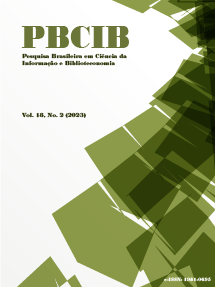Capacidades dinâmicas como ferramenta de apoio para a transformação digital das organizações
Palavras-chave:
Transformação Digital, Transformação Organizacional, Capacidades DinâmicasResumo
Este artigo tem como objetivo identificar como as capacidades dinâmicas podem apoiar as organizações no processo de transformação digital. Trata-se de uma revisão sistemática da literatura, a partir da base de dados Scopus e WOS, publicadas nos últimos 10 anos utilizando-se como palavras-chave os conceitos “transformação digital” e “capacidades dinâmicas”. A investigação buscou identificar estudos de caso com evidências empíricas sobre o tema pesquisado. A pesquisa apresenta como resultado que as capacidades dinâmicas podem apoiar as organizações no processo de transformação digital, na medida que elas incorporam uma característica fundamental que é a transformação organizacional, ou seja a flexibilidade de adaptação aos diferentes ecossistemas e modelos de negócios, por intermédio da inovação e da colaboração com outras instituições.
Disponível em: https://revista.ibict.br/p2p/article/view/5162
Referências:
AUGIER, M.; TEECE, D. J. Understanding complex organization: the role of know-how, internal structure, and human behavior in the evolution of capabilities. Industrial and Corporate Change, v. 15, n. 2, p. 395–416, 2006.
BARNEY, J. Firm resources and sustained competitive advantage. Journal of management, v. 17, n. 1, p. 99–120, 1991.
BHAMRA, R.; DANI, S.; BURNARD, K. Resilience: the concept, a literature review and future directions. International Journal of Production Research, v. 49, n. 18, p. 5375–5393, 2011.
BRYNJOLFSSON, E.; HITT, L. M. Beyond computation: Information technology, organizational transformation and business performance. Journal of Economic perspectives, v. 14, n. 4, p. 23–48, 2000.
DABAB, M.; WEBER, C. Business Intelligence and Data Analytics as a Driver of Dynamic Capability Strategic Approach. 2018 PORTLAND INTERNATIONAL CONFERENCE ON MANAGEMENT OF ENGINEERING AND TECHNOLOGY (PICMET). Anais...IEEE, ago. 2018
DE MENDONCA, C. M. C.; DE ANDRADE, A. M. V. Microfoundations of dynamic capabilities and their relations with elements of digital transformation in Portugal. (L.-T. A. G. R. Rocha A. Cota M.P., Ed.) IBERIAN CONFERENCE ON INFORMATION SYSTEMS AND TECHNOLOGIES, CISTI. Anais...IEEE Computer Society, 2018
DUGSTAD, J. et al. Towards successful digital transformation through co-creation: alongitudinal study of a four-year implementation of digital monitoringtechnology in residential care for persons with dementia. BMC Health Services Research, v. 19, jun. 2019.
FITZGERALD, M. et al. Embracing digital technology: A new strategic imperative. MIT sloan management review, v. 55, n. 2, p. 1, 2014.
HESS, T. et al. Options for formulating a digital transformation strategy. MIS Quarterly Executive, v. 15, n. 2, 2016.
HSU, C.-C.; TSAIH, R.-H.; YEN, D. C. The Evolving Role of IT Departments in Digital Transformation. Sustainability, v. 10, n. 10, out. 2018.
KONLECHNER, S.; MÜLLER, B.; GÜTTEL, W. H. A dynamic capabilities perspective on managing technological change: a review, framework and research agenda. International Journal of Technology Management, v. 76, n. 3/4, p. 188, 2018.
LIU, D.-Y.; CHEN, S.-W.; CHOU, T.-C. Resource fit in digital transformation Lessons learned from the CBC Bankglobal e-banking project. Management Decision, v. 49, n. 9–10, p. 1728– 1742, 2011.
PORTER, M. E.; HEPPELMANN, J. E. How smart, connected products are transforming competition. Harvard business review, v. 92, n. 11, p. 64–88, 2014.
RIERA, C.; IIJIMA, J. The Role of IT and Organizational Capabilities on Digital Business Value. Pacific Asia Journal of the Association For Information Systems, v. 11, n. 2, p. 67– 95, jun. 2019.
ROGERS, D. L. The digital transformation playbook: Rethink your business for the digital age. [s.l.] Columbia University Press, 2016.
SÁNCHEZ, M. A. A framework to assess organizational readiness for the digital transformation. Dimensión Empresarial, v. 15, n. 2, p. 27–40, 2017.
SÁNCHEZ, M. A.; ZUNTINI, J. I. Organizational readiness for the digital transformation: a case study research. Revista Gestão & Tecnologia, v. 18, n. 2, p. 70–99, 29 jun. 2018.
TEECE, D. J. Business models and dynamic capabilities. Long Range Planning, v. 51, n. 1, p. 40–49, 2018.
TEECE, D. J. Dynamic capabilities and entrepreneurial management in large organizations: Toward a theory of the (entrepreneurial) firm. European Economic Review, v. 86, p. 202– 216, 2016.
TEECE, D. J. Explicating dynamic capabilities: the nature and microfoundations of (sustainable) enterprise performance. Strategic management journal, v. 28, n. 13, p. 1319– 1350, 2007.
TEECE, D. J.; PISANO, G.; SHUEN, A. Dynamic capabilities and strategic management. Strategic management journal, v. 18, n. 7, p. 509–533, 1997.
TEECE, D.; PISANO, G. The dynamic capabilities of firms: an introduction. Industrial and Corporate Change, v. 3, 1994.
TEECE, D.; PISANO, G.; SHUEN, A. Dynamic capabilities and strategic management. Strategic Management Journal, v. 18, 1997.
TORRES-CARRIÓN, P. V. et al. Methodology for Systematic Literature Review applied to Engineering and Education. IEEE Global Engineering Education Conference (EDUCON), p. 1370-1379, 2018.
VIAL, G. Understanding digital transformation: A review and a research agendaJournal of Strategic Information Systems, fev. 2019.
WARNER, K. S. R.; WÄGER, M., Building dynamic capabilities for digital transformation: An ongoing process of strategic renewal. Long Range Planning, v. 52, n. 3, p. 326–349, 2019.

















